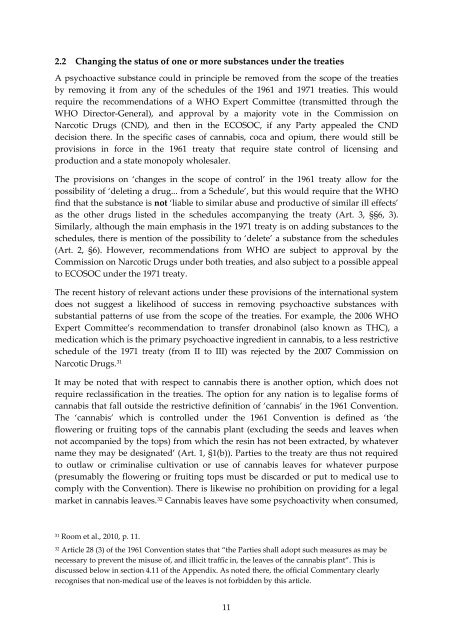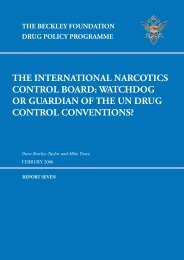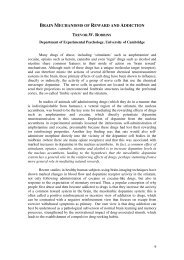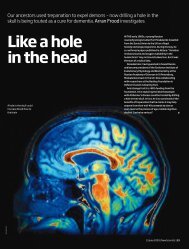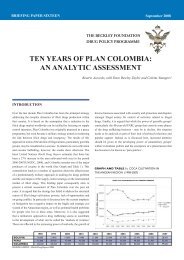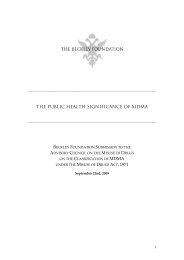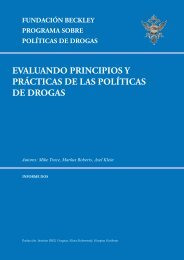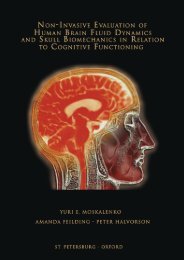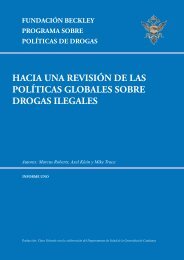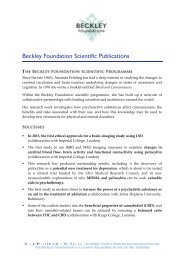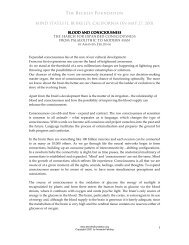2.2 Changing <strong>the</strong> status of one or more substances <strong>un</strong>der <strong>the</strong> treatiesA psychoactive substance could in principle be removed from <strong>the</strong> scope of <strong>the</strong> treatiesby removing it from any of <strong>the</strong> schedules of <strong>the</strong> 1961 and 1971 treaties. This wouldrequire <strong>the</strong> recommendations of a WHO Expert Committee (transmitted through <strong>the</strong>WHO Direc<strong>to</strong>r-General), and approval by a majority vote in <strong>the</strong> Commission onNarcotic Drugs (CND), and <strong>the</strong>n in <strong>the</strong> ECOSOC, if any Party appealed <strong>the</strong> CNDdecision <strong>the</strong>re. In <strong>the</strong> specific cases of cannabis, coca and opium, <strong>the</strong>re would still beprovisions in force in <strong>the</strong> 1961 treaty that require state control of licensing andproduction and a state monopoly wholesaler.The provisions on ‘changes in <strong>the</strong> scope of control’ in <strong>the</strong> 1961 treaty allow for <strong>the</strong>possibility of ‘deleting a <strong>drug</strong>... from a Schedule’, but this would require that <strong>the</strong> WHOfind that <strong>the</strong> substance is not ‘liable <strong>to</strong> similar abuse and productive of similar ill effects’as <strong>the</strong> o<strong>the</strong>r <strong>drug</strong>s listed in <strong>the</strong> schedules accompanying <strong>the</strong> treaty (Art. 3, §§6, 3).Similarly, although <strong>the</strong> main emphasis in <strong>the</strong> 1971 treaty is on adding substances <strong>to</strong> <strong>the</strong>schedules, <strong>the</strong>re is mention of <strong>the</strong> possibility <strong>to</strong> ‘delete’ a substance from <strong>the</strong> schedules(Art. 2, §6). However, recommendations from WHO are subject <strong>to</strong> approval by <strong>the</strong>Commission on Narcotic Drugs <strong>un</strong>der both treaties, and also subject <strong>to</strong> a possible appeal<strong>to</strong> ECOSOC <strong>un</strong>der <strong>the</strong> 1971 treaty.The recent his<strong>to</strong>ry of relevant actions <strong>un</strong>der <strong>the</strong>se provisions of <strong>the</strong> international systemdoes not suggest a likelihood of success in removing psychoactive substances withsubstantial patterns of use from <strong>the</strong> scope of <strong>the</strong> treaties. For example, <strong>the</strong> 2006 WHOExpert Committee’s recommendation <strong>to</strong> transfer dronabinol (also known as THC), amedication which is <strong>the</strong> primary psychoactive ingredient in cannabis, <strong>to</strong> a less restrictiveschedule of <strong>the</strong> 1971 treaty (from II <strong>to</strong> III) was rejected by <strong>the</strong> 2007 Commission onNarcotic Drugs. 31It may be noted that with respect <strong>to</strong> cannabis <strong>the</strong>re is ano<strong>the</strong>r option, which does notrequire reclassification in <strong>the</strong> treaties. The option for any nation is <strong>to</strong> legalise forms ofcannabis that fall outside <strong>the</strong> restrictive definition of ‘cannabis’ in <strong>the</strong> 1961 Convention.The ‘cannabis’ which is controlled <strong>un</strong>der <strong>the</strong> 1961 Convention is defined as ‘<strong>the</strong>flowering or fruiting <strong>to</strong>ps of <strong>the</strong> cannabis plant (excluding <strong>the</strong> seeds and leaves whennot accompanied by <strong>the</strong> <strong>to</strong>ps) from which <strong>the</strong> resin has not been extracted, by whatevername <strong>the</strong>y may be designated’ (Art. 1, §1(b)). Parties <strong>to</strong> <strong>the</strong> treaty are thus not required<strong>to</strong> outlaw or criminalise cultivation or use of cannabis leaves for whatever purpose(presumably <strong>the</strong> flowering or fruiting <strong>to</strong>ps must be discarded or put <strong>to</strong> medical use <strong>to</strong>comply with <strong>the</strong> Convention). There is likewise no prohibition on providing for a legalmarket in cannabis leaves. 32 Cannabis leaves have some psychoactivity when consumed,31Room et al., 2010, p. 11.32Article 28 (3) of <strong>the</strong> 1961 Convention states that “<strong>the</strong> Parties shall adopt such measures as may benecessary <strong>to</strong> prevent <strong>the</strong> misuse of, and illicit traffic in, <strong>the</strong> leaves of <strong>the</strong> cannabis plant”. This isdiscussed below in section 4.11 of <strong>the</strong> Appendix. As noted <strong>the</strong>re, <strong>the</strong> official Commentary clearlyrecognises that non-medical use of <strong>the</strong> leaves is not forbidden by this article.11
ut considerably less potency than such forms as resin or sinsemilla; samples of ‘herbalcannabis’ seized by police in England in 2005 had a median potency of 2.1% of THC,though one sample had 11.8%. 33 It is <strong>un</strong>der <strong>the</strong> definition of cannabis in <strong>the</strong> 1961Convention that retail shops selling bhang, an infusion normatively of cannabis leaves,are licensed in a number of Indian states by <strong>the</strong> state government, 34 although <strong>the</strong> treatydefinition appears <strong>to</strong> be applied quite loosely. 352.3 Collective neutralisation of aspects of existing treaties by adoption of a newtreatyWhen treaties conflict, a traditional rule in international law has been that <strong>the</strong> morerecent treaty takes precedence. Thus, one option for a group of nations would be <strong>to</strong>effectively neutralise provisions of an existing treaty which <strong>the</strong>y disfavoured byadopting a new treaty in <strong>the</strong> same area.As often in international law, things are not quite that simple. Parties <strong>to</strong> <strong>the</strong> new treatywho had not withdrawn from <strong>the</strong> older one would still be bo<strong>un</strong>d by <strong>the</strong> obligations of<strong>the</strong> older treaty in <strong>the</strong>ir relations with states that were party <strong>to</strong> <strong>the</strong> old treaty but not <strong>the</strong>new one. Beyond this, <strong>the</strong>re are some fur<strong>the</strong>r complications which are not settled ininternational law, and which might be <strong>the</strong> subject of litigation, if such a new treaty wasadopted. 36 Despite such caveats, this would be a worthwhile strategy for a group of likemindedstates <strong>to</strong> pursue. Given <strong>the</strong> complication that <strong>the</strong> old treaty would still applywith Parties outside <strong>the</strong> new treaty, a new <strong>drug</strong> treaty would be easier <strong>to</strong> apply andperhaps more readily accepted if it retained <strong>the</strong> provisions of <strong>the</strong> present treaties oninternational trade in controlled <strong>drug</strong>s. Thus <strong>the</strong> draft Framework Convention on CannabisControl, which has been put forward by a group of scholars as a model for a new treatyon cannabis, keeps in place <strong>the</strong> international trade provisions of <strong>the</strong> present <strong>drug</strong>treaties, while laying out a set of provisions for domestic markets in cannabis modelledon <strong>the</strong> WHO Framework Convention on Tobacco Control. 37A path <strong>to</strong>wards <strong>the</strong> options described in Chapter 5 below might be for a group of states<strong>to</strong> agree among <strong>the</strong>mselves on a new treaty with <strong>the</strong> provisions from <strong>the</strong> current treatiesaltered as specified in one of <strong>the</strong>se Options. Given <strong>the</strong> difficulties along <strong>the</strong> path of asimple amendment process noted in 2.2 above, a new treaty among like-minded states33Potter, D.J., Clark, P., Brown, M.B. ‘Potency of Δ 9 -THC and o<strong>the</strong>r cannabinoids in England in 2005:Implications for psychoactivity and pharmacology’. Journal of Forensic Sciences 53(1):90−94, 2008.34Room et al., 2010, pp. 99−100.35E.g., Gorman, P. Bhang! Bhang! You’re high! Peter Gorman Archive on web, viewed 25 December,2011. http://petergormanarchive.com/at/tales-from-india/bhang-bhang-youre-high.html (accessed 8July, 2012)36Room et al., 2010, pp. 136–138; Pauwelyn, J., Conflict of Norms in Public International Law: How WTOLaw Relates <strong>to</strong> O<strong>the</strong>r Rules of International Law, pp. 52−58, 306, 409. Cambridge, etc.: CambridgeUniversity Press, 2003.37Room et al., 2010, pp. 159−91.12
- Page 2 and 3: ROADMAPS TO REFORMINGTHE UN DRUG CO
- Page 4 and 5: ContentsPreface ...................
- Page 6 and 7: PrefaceTHE IDEA FOR this Report cam
- Page 8: PART I. POSSIBLE ROADMAPS
- Page 11 and 12: hope for serious progress, but we c
- Page 13 and 14: We do not underestimate the difficu
- Page 15 and 16: also imposes requirements concernin
- Page 17 and 18: domestic market, just as producers
- Page 19: Protocol strengthened some provisio
- Page 23 and 24: has announced its intention to reac
- Page 25 and 26: objected to. Concerning the 1971 tr
- Page 27 and 28: Table 2. Summary of reservations to
- Page 29 and 30: Reservations about traditional use
- Page 31 and 32: As Swaine notes, ‘the Vienna Conv
- Page 33 and 34: unhappy about a country implementin
- Page 35 and 36: Preemption by a new ‘single conve
- Page 37 and 38: and their effort was rejected by a
- Page 39 and 40: national or subnational level. Proh
- Page 42 and 43: Chapter 5. Proposed treaty amendmen
- Page 44 and 45: Article 1. DefinitionsExcept where
- Page 46 and 47: Article 36 - penal provisionsIn Art
- Page 48 and 49: Article 7. Special Provisions regar
- Page 50 and 51: and to ensure adequate supplies of
- Page 52 and 53: Article 1 − definition of ‘cons
- Page 54 and 55: Article 19 - estimates of drug requ
- Page 56 and 57: Article 21. Limitation of Manufactu
- Page 58 and 59: contrary to a law or regulation ado
- Page 60 and 61: 1. in subparagraph (a):a) after ‘
- Page 62 and 63: ) for ‘in accordance with paragra
- Page 64 and 65: include a number of general stateme
- Page 66 and 67: the legality of drug possession. A
- Page 68 and 69: Chapter 7. Conforming the 1961 Conv
- Page 70 and 71:
solely by Article 30, which require
- Page 72 and 73:
on trade activities referred to in
- Page 74 and 75:
(c) Require that licensed manufactu
- Page 76 and 77:
issued in the form of counterfoil b
- Page 78:
APPENDIXDETAILED COMMENTARY ON AMEN
- Page 81 and 82:
Articles 21-34 of the Convention im
- Page 83 and 84:
dispatch, transport, supply, purcha
- Page 85 and 86:
actions involving commercial quanti
- Page 87 and 88:
In the 1971 Convention the followin
- Page 89 and 90:
4.1.3 Option 2 - changes to Preambl
- Page 91 and 92:
separate estimates and statistical
- Page 93 and 94:
After ‘scientific research’, in
- Page 95 and 96:
would also include transforming a d
- Page 97 and 98:
(c) subject to the provisions of th
- Page 99 and 100:
endangered’ by a Party’s failur
- Page 101 and 102:
Article 9. Composition and Function
- Page 103 and 104:
2. The Board shall, in respect of c
- Page 105 and 106:
for the right of the INCB to establ
- Page 107 and 108:
) Subject to the deductions referre
- Page 109 and 110:
excess quantity must be deducted fr
- Page 111 and 112:
prohibition in Article 31(1)(b) aga
- Page 113 and 114:
4.8 Article 20 - statistical return
- Page 115 and 116:
separate returns would be required
- Page 117 and 118:
4.9.1 General comments on Article 2
- Page 119 and 120:
distributors), and any quantity tak
- Page 121 and 122:
a) The quantity consumed, within th
- Page 123 and 124:
Article 21 bis. Limitation of Produ
- Page 125 and 126:
to engage in cultivation; and culti
- Page 127 and 128:
the purposes of Option 2. However,
- Page 129 and 130:
in Article 29 to manufacture of mor
- Page 131 and 132:
) (i) Require medical prescriptions
- Page 133 and 134:
4.15 Article 31(1) - international
- Page 135 and 136:
commercial use. Export to a state o
- Page 137 and 138:
would automatically mean that posse
- Page 139 and 140:
preparatory acts, conspiracy and at
- Page 141 and 142:
offering for sale, distribution, 17
- Page 143 and 144:
Article 36. Penal Provisions1. a) S
- Page 145 and 146:
Article 36. Penal Provisions1. a) S
- Page 147 and 148:
Conference would have intended to a
- Page 149 and 150:
drugs (in more than small quantitie
- Page 151 and 152:
substances into its country or one
- Page 153 and 154:
apply to Schedule 1 substances. In
- Page 155 and 156:
substances (of more than a small qu
- Page 157 and 158:
1. The Parties shall require that t
- Page 159 and 160:
individuals may lawfully obtain, us
- Page 161 and 162:
4. The Parties shall furnish to the
- Page 163 and 164:
2. In subparagraph (b):a) after ‘
- Page 165 and 166:
obligations on Parties in respect o
- Page 167 and 168:
penalise preparatory acts in connec
- Page 169 and 170:
accordance with subparagraph (a) of
- Page 171 and 172:
Article 3(1)(c)(iii) warrants speci
- Page 173 and 174:
6.1.2. Option 1 - changes to the 19
- Page 175 and 176:
uncertainty. Accordingly, Article 3
- Page 177 and 178:
Consequently, Parties would also no
- Page 179:
…4. d) The Parties may provide, e


